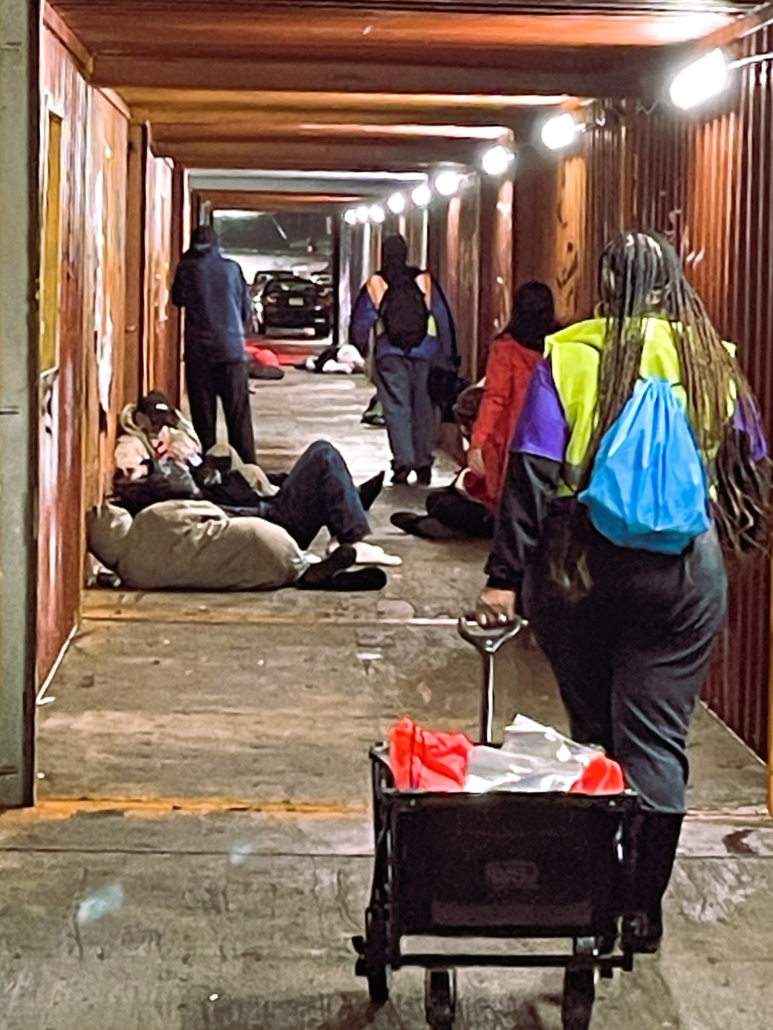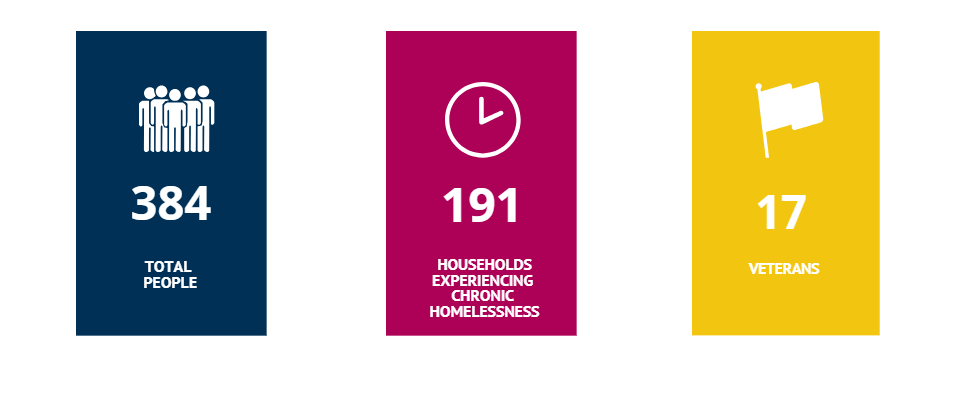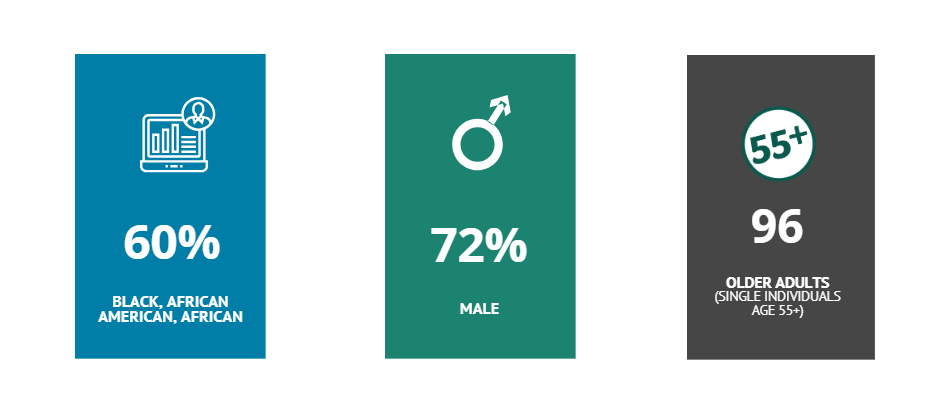2024 Point-in-Time Count: Unsheltered Homelessness in Charlotte-Mecklenburg
Mary Ann Priester
Senior Management Analyst
Mecklenburg County Community Support Services
Jessica Lefkowitz
Executive Director
Hearts for the Invisible Charlotte Coalition, Inc.
On January 25, 2024, 28 CMPD officers and 35 teams of over 200 community volunteers came together to ensure #EverybodyCountsCLT and conduct the 2024 Point in Time Count Unsheltered Census. Together these dedicated community members facilitated a successful Count by providing logistical support and conducting surveys with people experiencing unsheltered homelessness across Mecklenburg County.
This blog focuses on findings from the 2024 Unsheltered Homeless Census and the work being done locally to address unsheltered homelessness in Charlotte-Mecklenburg.
Point-in-Time Count
The HUD Point-in-Time (PIT) count is an annual nationwide endeavor to gather comprehensive data on homelessness in the United States. Taking place on a single night in January each year, it offers a snapshot of homelessness at that moment, with key goals of estimating the number of people experiencing homelessness and understanding their demographic characteristics and living situations. The PIT count consists of two components: the Sheltered Homeless Census, which counts individuals in emergency shelters, safe havens, or transitional housing on the PIT night, and the Unsheltered Homeless Census. This blog will focus on the Unsheltered Homeless Census. A future blog post will present data from the 2023 Sheltered Homeless Census.
Unsheltered Homeless Trends
Unsheltered homelessness has surged across many parts of the US in recent years due to factors like housing affordability issues, income inequality, and limited social services access. Urban areas, especially high-cost cities, bear a significant burden. Various vulnerable groups, including veterans, those with mental health or substance abuse problems, LGBTQ+ youth, and homeless families, are disproportionately affected. Lack of affordable housing and healthcare and difficulties associated with their unsheltered homelessness such as staying connected to services or employment, compound their challenges.
Living unsheltered exposes individuals to health and safety risks like extreme weather, violence, and health disorders. Inadequate access to clean water, sanitation, and healthcare services exacerbate health vulnerabilities. Communities struggle with limited resources, leading to insufficient shelter capacities and inadequate funding for supportive services and housing initiatives. The COVID-19 pandemic has worsened the situation by reducing shelter capacities, intensifying economic challenges, and increasing health risks for the unsheltered population.
Unsheltered Homeless Census
Estimating the number of individuals experiencing unsheltered homelessness is a crucial aspect of the PIT count. The Unsheltered Homeless Census gathers data on those living in places not meant for habitation, such as streets, vehicles, or encampments. Volunteers and outreach teams canvas the community to locate and engage individuals who are unsheltered and conduct surveys with them to gather demographic information like age, gender, veteran status, and duration of homelessness. The goal is to gain a comprehensive understanding of people living unsheltered and their specific needs.
While every effort is made to engage all people experiencing unsheltered homelessness across the entire geographic area of Mecklenburg County during the PIT Count, the Count is widely recognized as an undercount for various reasons including methodological limitations and the transient or hidden nature of homelessness. The PIT count’s reliance on a single night snapshot may miss those who experience homelessness intermittently or are not in surveyed locations that specific night. Some individuals may deliberately avoid the count due to fear, mistrust, or concerns about legal status or involvement with authorities. Families in particular often stay hidden due to fear of family breakup or other consequences of disclosing their unsheltered homelessness. Despite these challenges, the PIT count remains vital for assessing homelessness trends and guiding policy decisions. To complement the PIT count, local efforts incorporate other data sources and methodologies, like the regularly updated One Number, to gain a more comprehensive understanding of homelessness in Charlotte-Mecklenburg.
Local Count and Data
In the early morning of January 25, 2024, a dedicated group of close to 250 community volunteers came together to facilitate and conduct the 2024 Charlotte-Mecklenburg Point-in-Time Count Unsheltered Homeless Census. They canvassed the entire geographic area of Mecklenburg County to locate, engage, and survey individuals experiencing unsheltered homelessness. In addition, the Mecklenburg County CoC leveraged Homeless Management Information System (HMIS) data to identify people who may have been unsheltered on the night of the PIT. Through this effort, 384 persons experienced unsheltered homelessness were identified. Forty-four percent were ages 25-44, 25% were aged 55 or older, and 7% were ages 18-24. Seventy-two percent identified as male; 60% identified as Black, African American, or African and 29% identified as White. Four percent identified as Hispanic/Latina(e)(o).
Fifty percent of people who were unsheltered also reported being chronically homeless which means they report a disability AND either a year continuous homelessness or 4 episodes of homelessness in the previous 3 years totaling 12 months. This year is the highest unsheltered count since 2010 and a 79% increase in unsheltered homeless since the 2020 pre-pandemic count.
It is important to note that while local increases in unsheltered homelessness are consistent with national trends, the increases that we see may be due, at least in part, to expanded street outreach capacity and coordination in Charlotte-Mecklenburg. This effort has enabled us to better identify and engage people experiencing unsheltered homelessness and to better identify and document locations where people experiencing unsheltered homelessness might be. This expanded capacity helped us better identify places to canvas for the count and ultimately resulted in our ability to engage more people experiencing unsheltered homelessness on the night of the PIT.
Local Efforts
To tackle unsheltered homelessness effectively, a comprehensive approach is needed. This involves a combination of immediate relief efforts and long-term solutions. Priorities include boosting affordable housing options, enhancing access to mental health and substance abuse treatment, fortifying supportive services, and promoting community partnerships. These measures are crucial for addressing unsheltered homelessness and safeguarding the well-being of individuals experiencing homelessness, both locally and nationally.
In early 2023, Mecklenburg County make a significant investment in addressing unsheltered homelessness by designating $650,000 in funding from the American Rescue Plan Act to develop a program focused on strategic outreach to individuals experiencing unsheltered homelessness. This initiative, informed by insights from the North End encampment project and input from the Charlotte-Mecklenburg Continuum of Care’s Unsheltered Workgroup, sought to enhance street outreach efforts, improve accessibility to services, and reduce the duration of time people spend living unsheltered. Through an RFP process, Hearts For The Invisible Charlotte Coalition, Inc. (HFTIC) was chosen as the recipient of this funding and has been serving as the lead agency for homeless street outreach in Mecklenburg County since April 2023. HFTIC deploys multidisciplinary teams to provide housing-focused street outreach and connect individuals and families to physical health, mental health, and substance abuse providers, and to other community resources. Their efforts include crisis interventions, case management, peer support, housing navigation, and referrals to social services. HFTIC also collaborates with other local agencies who serve people experiencing unsheltered homelessness to ensure a coordinated response and maximize service delivery to people living unsheltered in Mecklenburg County. In addition, the County also designated funding to Block Love Charlotte to establish a Day Services Center. The recently opened Day Services Center has both day and evening hours and will provide critical services to people experiencing homelessness.
To expand capacity to address unsheltered homelessness, the Continuum of Care also recommended State Emergency Solutions Grant funding for two new street outreach projects to be established and continued funding for an existing street outreach project. The City of Charlotte also funded an additional street outreach project in North Charlotte to ensure accessibility to services for people living unsheltered in the Northern part of the County.
In February 2024, in response to growing community concern about the need to expand resources to address unsheltered homelessness, the A Home for All initiative added the Emergency Response Pillar to their Implementation Plan. The Emergency Response Pillar is focused on expanding street outreach, health and human services, and emergency shelter and housing for people experiencing unsheltered homelessness.
In addition, recently, the City of Charlotte directed additional funding to HFTIC to establish a multidisciplinary outreach team that will focus its efforts on people living unsheltered in Uptown and South End.
So Why Does This Matter?
The data collected through the Point in Time Count Unsheltered Census is essential for informing policy decisions, allocating resources, and designing effective interventions to address unsheltered homelessness. It helps identify trends, track progress, and evaluate the impact of programs aimed at reducing unsheltered homelessness. By understanding the size and characteristics of this population, Charlotte-Mecklenburg can continue to develop and implement targeted strategies to provide the necessary services and support for this vulnerable group. Strategic street outreach bridges the gap between people experiencing unsheltered homelessness and available services, offering support and pathways to stability. Collaboration and intentional partnerships are essential to ensure a coordinated and comprehensive response that facilitate rapid, person-centered care for people experiencing unsheltered homelessness in Mecklenburg County.
If you are interested in getting involved in the work to end unsheltered homelessness, the Continuum of Care’s Unsheltered Workgroup meets the first Thursday at 2PM. For more information, please email the Continuum of Care at CharMeckCoC@MeckNC.gov




